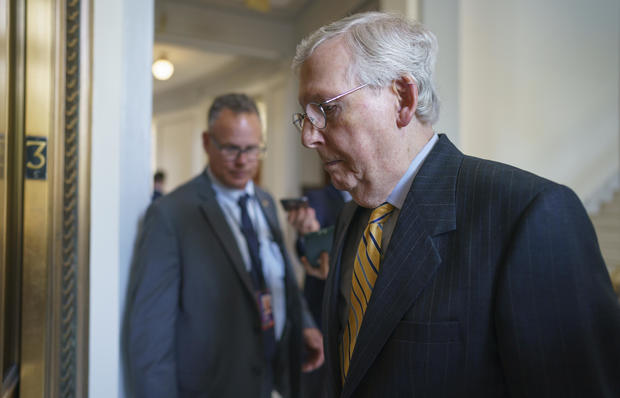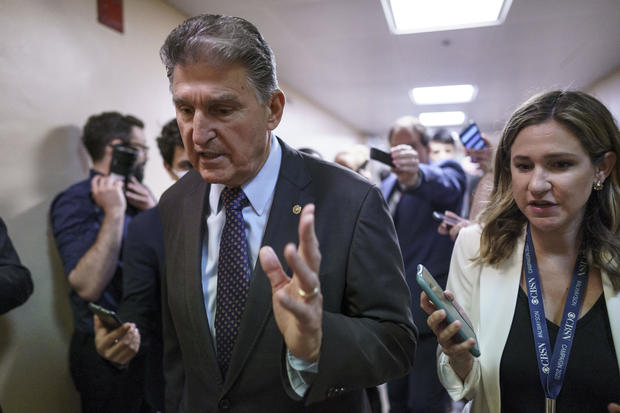Senate Republicans block commission on January 6 insurrection
Senate Republicans blocked the House-passed bill creating a commission to investigate the January 6 attack on the U.S. Capitol by a mob of Trump supporters, signaling the strength of the party's loyalty to the former president. Although most Republicans were unified in their opposition to the bill, worrying that a commission would drag into next year and potentially affect GOP chances of retaking Congress in the 2022 midterms, six voted to advance the bill.
The vote to advance the bill failed by 54 to 35, well short of the 60 votes needed. Republican Senators Bill Cassidy, Susan Collins, Lisa Murkowski, Rob Portman, Mitt Romney, and Ben Sasse supported advancing the bill. All but Portman voted to convict former President Trump on the impeachment charge of incitement of insurrection in February. GOP Senator Patrick Toomey was not present for the vote due to a family commitment, but said in a statement that he would have supported advancing the measure.
Senate Majority Leader Chuck Schumer blasted Republicans for their vote, asking if they had forgotten how the insurrectionists had threatened the lives of former Vice President Mike Pence and lawmakers themselves on January 6, and attacked the police officers defending the building.
"Shame on the Republican Party for trying to sweep the horrors of that day under the rug because they're afraid of Donald Trump," Schumer said, noting that many Republicans continued to embrace Mr. Trump's false claims that the election was stolen. "Senate Republicans chose to defend the 'big lie' because they believe anything that might upset Donald Trump could hurt them politically."
Schumer also indicated that he might force another vote on the bill at a later time.
At least one Republican who supported the bill also expressed frustration with members of their own party. Murkowski said Thursday night it was "disappointing" that an independent commission didn't appear to be in the offing, and criticized Senate Minority Leader Mitch McConnell for prioritizing electoral politics.
"To be making a decision for the short-term political gain at the expense of understanding and acknowledging what was in front of us on January 6, I think we need to look at that critically. Is that really what this is about, one election cycle after another?" Murkowski said. McConnell has argued publicly that there are already ongoing investigations by congressional committees and the Justice Department, making a bipartisan, independent commission redundant.
"I'm disappointed that we just haven't been able to acknowledge that an independent commission would be an opportunity for us to have an independent review of this while we do our work," Murkowski said. U.S. Capitol Police Officer Eugene Goodman, who directed a group of rioters away from the Senate chamber on January 6, happened to be standing behind Murkowski as she spoke to reporters.
"Truth is hard stuff, but we've got a responsibility to it," she said. "We just can't pretend that nothing bad happened, or that people just got too excitable. Something bad happened. And it's important to lay that out."
The bill would create a 10-member commission evenly divided between members selected by Democratic and Republican leaders. Both sides would have equal subpoena power, and the commission will be tasked with issuing a report with findings about the January 6 attack by the end of the year. Much of the language in the legislation is copied from the bill creating the 9/11 commission, which passed with an overwhelmingly bipartisan vote in the Senate in 2002.
Both parties called for a creation of a 9/11-style commission in the aftermath of the attack, when rioters overran the Capitol as Congress was counting the electoral votes. But Republicans have backed down in recent months, arguing their party should focus instead on retaking Congress the 2022 midterm elections.
"I guess now we'll never know," Murkowski said Thursday of unresolved questions about the January 6 attack. "Isn't that part of the problem, that we'll never know? It'll never be resolved. It'll always be hanging out there."
Several Democrats have called for eliminating the filibuster, and see this bill as further evidence that bills should be permitted to advance with a simple majority. Senator Joe Manchin of West Virginia, the most vocal Democratic opponent of eliminating the filibuster, said Thursday that he is is still unwilling to take that step.
But Manchin told reporters after the vote on Friday that he was "very frustrated" by the outcome of the vote, and said that he believed it more Republicans would have voted to advance the bill if McConnell hadn't actively urged his members not to support it.
"I can tell you now by objecting to it, and peeling people off that would in their heart want to support it, and you can talk to Susan Collins, there was an awful lot of other Republicans that would have supported if it hadn't been for his personal intervention," Manchin said.
In a scathing statement released after the vote, Manchin said that "the betrayal of the oath we each take is something [Republicans] will have to live with."
"To the brave Capitol police officers who risk their lives every single day to keep us safe, the Capitol and Congressional staff that work around the clock to keep Congress running, even the reporters who work hard to deliver Congressional news to the American people and every American who watched in horror as our Capitol was attacked on January 6th – you deserve better and I am sorry that my Republican colleagues and friends let political fear prevent them from doing what they know in their hearts to be right," Manchin said.
McConnell has repeatedly indicated he wants to move past January 6, and argued that it would be a "purely political exercise." The bipartisan bill, which passed in the Democrat-controlled House earlier this month, was negotiated in part by the Republican ranking member of the House Homeland Security Committee.
Speaker Nancy Pelosi slammed Republicans in a statement for shooting down the bill, saying that "Republican Senators surrendered to the January 6 mob assault" with their vote.
"Leader McConnell and Senate Republicans' denial of the truth of the January 6th insurrection brings shame to the Senate. Republicans' cowardice in rejecting the truth of that dark day makes our Capitol and our country less safe," Pelosi said. "Democrats worked across the aisle, agreeing to everything that Republicans asked for. We did this in the interest of achieving a bipartisan Commission. In not taking yes for an answer, Republicans clearly put their election concerns above the security of the Congress and country."
Collins had circulated an amendment pertaining to commission staff selection that would have been considered by both the House and Senate if the bill had advanced. Republicans worried the House-passed bill would allow the Democratic commissioners to hire all staffers, and Collins' amendment would assuage GOP concerns by ensuring Republican commissioners would have an equal hand in staff selection as well. However, Collins' amendment did not convince a sufficient number of Republicans to support the bill.
Pelosi indicated that the Democratic-led committees in the House would continue to investigate the attack. Unlike congressional committees, the independent commission would not have included any elected officials.
"Honoring our responsibility to the Congress in which we serve and the Country which we love, Democrats will proceed to find the truth," Pelosi said.
Republicans also faced renewed pressure from Gladys Sicknick, the mother of U.S. Capitol Police Officer Brian Sicknick, who died the day after batting rioters at the Capitol on January 6th. Not even a last minute push by the mother of a fallen officer and current serving officers could convince most Republicans to change their minds.
Gladys Sicknick requested a meeting with each Republican senator on Thursday "to discuss the importance of establishing the bipartisan January 6th Commission," according to a copy of the meeting request obtained by CBS News. She met with several senators who expressed opposition to creating a commission as well as some supporters.
She was joined by Sandra Garza, Brian Sicknick's girlfriend, during her meetings with certain Republican senators, as well as former GOP Congresswoman Barbara Comstock of Virginia, Metropolitan Police Officer Michael Fanone, and U.S. Capitol Police Officer Harry Dunn. Fanone suffered a heart attack and a concussion during the attack on January 6, and Dunn was called slurs by several of the insurrectionists.
"Usually I'm staying in the background and I just couldn't, I couldn't stay quiet anymore," Gladys Sicknick told reporters after meeting with Romney on Thursday morning.
Alan He, Rebecca Kaplan and Jack Turman contributed to this report.





